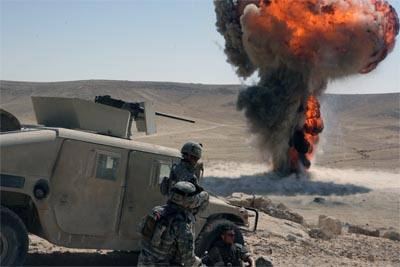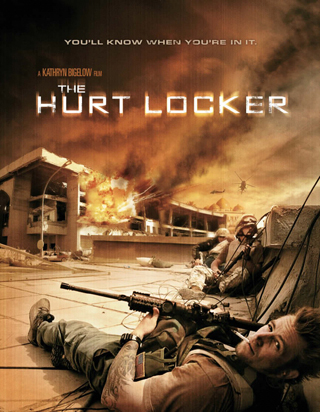"UNCRITICAL CRITICS" PRAISE THE APOLITICAL TO A FAULT
 "Nobody benefits when critics are as apolitical as the films they criticize," writes critic David Sterritt in regards to the critical praise heaped on Kathryn Bigelow's The Hurt Locker, currently making its way in theaters throughout the U.S. The critical consensus does seem to be that Bigelow's film lacks any political viewpoint (is this even truly possible?), and that it is all the better for it. There have been a couple of negative reviews of The Hurt Locker posted at Andrew Breitbart's conservative-minded Big Hollywood, where John Nolte sees "unnecessary" political messages throughout, and Alexander Marlow calls it "a left-wing film."
"Nobody benefits when critics are as apolitical as the films they criticize," writes critic David Sterritt in regards to the critical praise heaped on Kathryn Bigelow's The Hurt Locker, currently making its way in theaters throughout the U.S. The critical consensus does seem to be that Bigelow's film lacks any political viewpoint (is this even truly possible?), and that it is all the better for it. There have been a couple of negative reviews of The Hurt Locker posted at Andrew Breitbart's conservative-minded Big Hollywood, where John Nolte sees "unnecessary" political messages throughout, and Alexander Marlow calls it "a left-wing film." "While the film is excellent in some respects," Sterritt writes of The Hurt Locker, "its politics are worrisome – not because they’re wrong, but because there are no politics in a film about the most politically fraught conflict in recent memory. And the eagerness of critics to overlook or excuse this bothers me just as much." Sterritt agrees that Bigelow's film has more "hair-raising action" than either Brian De Palma's Redacted or Paul Haggis' In The Valley Of Elah (the latter written, like The Hurt Locker, by Mark Boal). But, Sterritt states, the Hurt Locker "comes up extremely short in the politics department." Sterritt doesn't just criticize the filmmakers for being shortsighted in failing to address the politics involved in the war in Iraq-- he also chastises critics for praising the film's apparent lack of ideology:
Dana Stevens of Slate wraps up a rave by saying The Hurt Locker is “without question the most exciting and least ideological movie yet made” about the Iraq war, as if excitement sans ideology – any ideology – were the formula for top-grade cinema. Numerous reviewers find the film’s vagueness about geopolitics, and even geography, a plus rather than a minus. “It so happens that The Hurt Locker takes place in Iraq,” writes Lisa Schwarzbaum in Entertainment Weekly. “But geography is almost beside the point.” Kenneth Turan says in the Los Angeles Times that “it’s unfair to burden The Hurt Locker with the Iraq label” since there’s “no sense of winning or losing a war here, no notion of making a difference or achieving lofty geopolitical aims,” echoing Boal’s dubious distinction between movies that actually think and movies that just move. Politics don’t even occur to Roger Ebert, who calls The Hurt Locker “a great film, an intelligent film, a film shot clearly so that we know exactly who everybody is and where they are and what they're doing and why.” Has the bar for great, intelligent films slipped so low that a movie qualifies by being comprehensible?And so it goes. David Edelstein recognizes the political shallowness of The Hurt Locker near the end of his New York review, then promptly endorses it. “Last but maybe foremost are the politics—or lack of them,” he writes, commendably bringing up the problem. “The question of what the hell these good men are doing,” he continues, “in a culture they don’t understand with a language they don’t speak surrounded by people they can’t read hangs in the air but is never actually called.” So far, so good, until he asks the rhetorical question, “Or is that why this movie rises above its preachy counterparts?” This raises two non-rhetorical questions in my mind: What qualities make those counterparts preachy, as opposed to informative or provocative? And what counterparts are we talking about, anyway? The critic gives no clue. Over at the Village Voice, meanwhile, Scott Foundas rightly notes that some film-festival viewers tagged The Hurt Locker “apolitical,” and then he executes the same maneuver as Edelstein, saying those comments only show that the film “is mercifully free of ham-fisted polemics” and is content to “immerse us in an environment.” I’m as anti-ham-fist as the next moviegoer, but there would have been plenty of room in that environment for some progressive polemics.
In another mostly perceptive article, New York Times critic A.O. Scott calls Bigelow “one of the few directors for whom action-movie-making and the cinema of ideas are synonymous,” saying you may “emerge from The Hurt Locker shaken, exhilarated and drained, but you will also be thinking.” Thinking about what, however? “Not necessarily about the causes and consequences of the Iraq war,” Scott hastens to add. Scott’s conclusion is a let-down, but at least he explicitly faults the movie’s political limitations, saying that the filmmakers’ concentration on moment-to-moment experience is “a little evasive.” Take out the “little” and the point would be better made.
David Denby’s review in The New Yorker is also both insightful and problematic. The Hurt Locker is not political, he writes, “except by implication—a mutual distrust between American occupiers and Iraqi citizens is there in every scene.” Again the film’s political shortfall – its politics are only implicit, and they encompass nothing more profound or sweeping than distrust – is nothing to fret about. “The specialized nature of the subject is part of what makes [the film] so powerful,” Denby continues, “and perhaps American audiences worn out by the mixed emotions of frustration and repugnance inspired by the war can enjoy this film without ambivalence or guilt.” I’m not sure “enjoy” is exactly what Denby meant to say in this context, but I am sure that movie-movie pleasure is not the best contribution a war-themed film can make to a culture that’s politically challenged to begin with.
BIGELOW: "IT'S NOT MY POSITION TO JUDGE"
Bigelow told the Chicago Tribune's Michael Phillips that The Hurt Locker "seems to have touched a nerve, no matter which side of the aisle you're on." She further stated, "My job is to communicate; it's not my position to judge or dictate policy. I find it annoying when a film takes a superior attitude and doesn't provide the information in order for me to make my own decision. I don't want to be told what to think."




 Scott Foundas filed a review of The Hurt Locker yesterday from Toronto at his
Scott Foundas filed a review of The Hurt Locker yesterday from Toronto at his 